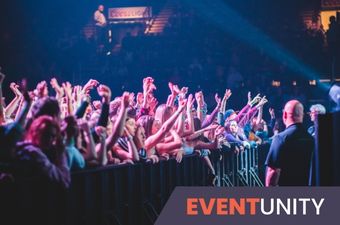Event venues come in all shapes and sizes, but often there are common income sources across each. Understanding what these are and how to maximize them is key to turning a profit with your events.
Venues make money through the sale of event tickets, food, drink, merchandise and venue hire. Additional sources of income include sponsorship or VIP experiences
I was a venue manager for over ten years, there is plenty to be said for the profession, it can be extremely rewarding, but you have to have your wits about you to make sure that your venue can make money and a profit. It is true that sometimes venues can be free (see my other post on this), but there are many other ways that event venues can make money.

Venues can host many different types of events such as music concerts, weddings, conferences, art exhibitions and many more. Broadly a venue will fall into one of these groups:
Music / Arts Venues – The kind that host live music, arts, or cultural shoes
Business Venues – Those specifically tailored to conferences or exhibitions
Personal Event Venues – Those tailored to personal events, mainly things like weddings.
Multifunctional Venues – Those with the capacity to host a mix of the above using highly configurable setups.
Generally, the income and profit are likely to be lowest for music and arts venues. There is little margin in the business model of short events (like music shows) where there may only be a few hours to sell some drinks.
On the other side, high-standard business or personal event venues can command significant venue rentals and these events benefit from a much longer dwell time. Dwell time is the time you have to sell attendees additional products like food, drink or merchandise.
How do event venues make money?
Each of those different venue groups above will have various sources of income, some of which will be more lucrative than others. Here are the most common forms of income for event venues:
Venue income from event tickets
Many venues that promote their own events or shows will sell tickets for them. This can be a small or very large fee depending on the show or entertainment. In the case of live music, the price is defined by the popularity of the headline artist. See our post on how to price event tickets here for more information.
Venue income from food
Food is a great source of income for many event venues, particularly those that host dinners, weddings, or parties. Food can also be a good source of income for business events which often span several days and so must provide food to their delegates. The price of the food will depend on the quality of the food and of the venue. It is likely many venues will offer food menus in a variety of different price ranges to suit different clients.
Venue income from drinks
As with food, selling drinks can be highly lucrative. For business events, this will mainly be refreshment but can involve some alcohol sales. For those music/arts venues or wedding venues, selling drinks is an essential part of the experience for attendees. As with food, the price will largely depend on the quality of the drink and the service style (bar or table service for example). Some venues often bring in mobile bars if they don’t have an in-house service.
Venue income from merchandise
Merchandise can be another great source of income for certain venues. These is typically music/arts venues and form part of things like live music concerts where people wish to take home a memento of the event. It’s unlikely (but not impossible) that business or wedding venues might sell some merchandise.
Venue income from VIP experiences
Those event venues that operate their own events, particularly music events, can upsell VIP packages such as booths or drinks in order to raise additional income. Typically these have a very high margin and can be very lucrative.
Venue income from venue hire
For many venues, this will be the biggest source of income and the basis of their business model. In essence, venues will charge people to use the space. Venues often offer different packages for different event styles and budgets in order to appeal to the widest possible audience. There are commonly two types of venue hire:
Event Venue Dry Hire
The venue is hired as an empty shell and the hirer must provide all content and decorations themselves.
Event Venue Wet Hire
The venue provides additional services such as food, drink and decorations.
How much does it cost to run a music venue?
There are numerous costs associated with running a venue, and while there are some nuisances with different styles of venue, there are often common overheads.
Venues are expensive to run, with operating costs ranging from anything from $100,000 to multiple millions of dollars. The size, type, and location of the venue play a large role in how high these costs will be.
Let’s look at some of the major overheads you would face running a music venue right now.
Event Venue Costs
Rent, mortgage, or loan repayment
This is often one of the biggest costs and depends on the circumstances of the venue. Often venues are leased and so regular rent is due and this is set by the landlord at the start of any agreement. This should stay reasonably constant whether the venue is trading well or badly.
Staffing
This is another major cost and venues often rely on a high number of temporary or part-time staff due to the nature of the business. Some weeks can be very busy and others not, some using part-time or flexible staff is key to keeping on top of costs.
Entertainment
This will depend largely on the kind of venue in question. Some venues do not take the risk of promoting their own events and so leave this to any hirer or promoter. A small music venue may choose to do this and so will incur the costs of booking things like bands and the associated costs (sound and lighting) needed to put on the show. On the other hand, business events can be largely dry hire, where the venue is hired as an empty canvas.
How can I make money with a small venue?
There are three main ways to make money with a small venue: dry hire, wet hire or promoting events. Each carries a different level of requirement and risk for a venue owner.
As mentioned above, dry hire means hiring the venue as a blank canvas to someone, wet hire is the same, but you are able to sell add-ons such as food and drink. Promoting events means taking all of the risks of getting attendees to the venue yourself and then selling them add-ons like food and drink.
Conclusion
So there you have it, a full list of everything that goes into the average event venue’s budget. Of course, every venue is different and will have unique costs depending on its size, location, and amenities. But this should give you a good idea of what to expect when planning your next event. If you are interested in starting your own event venue or space, then check out this post I wrote on the subject.

